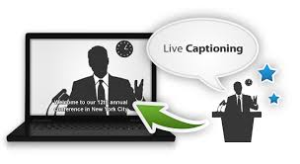By Margo Lucas
While captioning one Sunday morning, I noticed a gentleman who had walked in late and was trying to get my attention. When there was a pause in my writing, I glanced over and saw a big smile on his face as if he knew me. I vaguely recognized him but couldn’t place where I had seen him before.
After the service, he approached me and as soon as he spoke, I realized who he was. It had been some time since I had last seen Jim. I had briefly provided CART for him until he violated parole and was sent back to jail.
At one time he owned his own business, lived in a beautiful home in a wonderful community, and was happily married. His deafness occurred gradually. It was attributed to an overuse of antibiotics given to him as a child for ear infections, although his military tours also caused permanent hearing damage. (It is estimated that 70 percent of our military men and women return home with some form of hearing loss.). Hearing aids no longer worked for him, and he didn’t have coverage to pay for a cochlear implant. Soon he lost his business and his home, and he found himself divorced. As a deaf individual, he no longer fit in the hearing world, nor did he fit in with the Deaf community, as he had no sign language skills. He became isolated and escaped into the world of alcohol and drugs. After several encounters with the law, he was sentenced to prison.
Now, years later, here he was worshipping in church. I thought to myself, boy, he sure cleaned up well. He was sober and clean shaven with a fresh new haircut. He had on a nice pair of jeans and a collared shirt. His eyes were bright and cheerful, and his smile was contagious.
After a few weeks of attending church services regularly, he asked me if I would provide a transcript, which I did. Months later, he shared the impact those transcripts had not only on him but on the individuals he had been forwarding them to who were still incarcerated. This encouraged me to explore areas in which the captioning ministry could expand beyond church walls.
I learned many things as I tried to determine the benefits of providing a sermon transcript.
• Transcripts can be translated into other languages using text translators.
• Transcripts can be an aid to those learning English.
• Transcripts provide accessibility for people who are deaf or hard of hearing.
• Transcripts can be downloaded by people who are both blind and deaf and be used through a Braille reader.
• Individuals and study groups can keyword search transcripts, as well as highlight and print the sermons.
• Transcripts can be archived and cataloged electronically for quick reference by pastors and interns.
Many forgotten people or groups could benefit greatly from a sermon transcript if it is posted on your church’s website. Incarcerated individuals do not have access to the Internet to view or listen to sermons; however, they are allowed access to written material. Check local churches and inquire if they have a prison ministry or prison outreach. Oftentimes the ministry includes volunteers who write letters to inmates. Excerpts or transcripts in whole can be included with their notes of hope and encouragement. Google the county jails and state and federal prisons, and notify the chaplain of this accessible material that can be distributed.
Often churches have ministries to reach out to people of different languages in different countries. It is more accurate to translate one language to another from a transcript than an audio format. There are inexpensive software programs such as Systran Translator (www.systransoft.com) and Promt Translator (www.promt.com) or Yahoo’s free version of BabelFish (www.babelfish.com) that would allow people to translate the transcripts into various languages as a wonderful resource for international missionaries.
Transcripts would make the sermon accessible to people who are hearing impaired or deaf, as well as for people who are deaf and blind and have access to a Braille reader.
Research shows that when given a choice between an audio or transcript download, people are three times more likely to choose the transcript. Most people won’t take the time to listen to a 30-minute sermon, but they will take the time to read a transcript.
If you have been thinking of becoming involved in a captioning ministry but are not yet comfortable with writing realtime, this would be a wonderful post-production way to have an influence while honing your skills and building your dictionary. This is a nation starving for spiritual direction. By transcribing sermons, you would be an integral part in reaching many forgotten people groups.
“I had such a hard time finding a church that had captioning. I went to the church I had grown up in and tried a couple of other churches with my daughter. But every time we explained to the pastor that I couldn’t hear and didn’t know sign, they responded that there was nothing they could do. So, I just stopped going. If it wasn’t for Elmbrook Church offering captioning, I would not be able to attend services,” Jim said.
I was reminded of the quote: “Do all the good you can. By all the means you can. In all the ways you can. In all the places you can. At all the times you can. To all the people you can. As long as you ever can.”
Margo Lucas, CCP, CBC, RPR, CRI, is a CART provider based in Menomonee Falls, Wis. She can be reached at seeingtheword@wi.rr.com.
